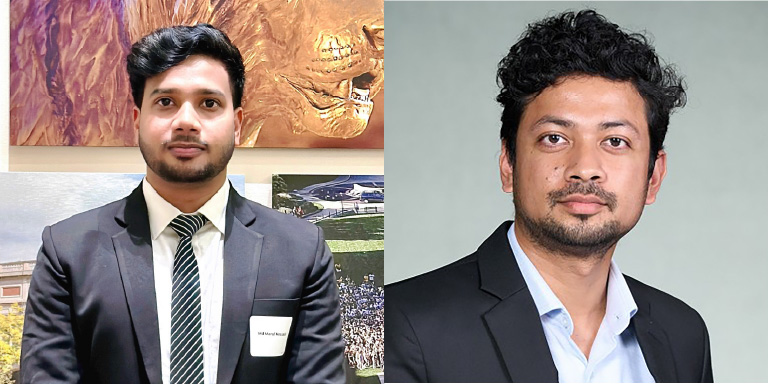April 10, 2025
The PhD students’ research opens a path toward more robust transistors for space applications and other extreme environments.

Mizzou Engineering doctoral students Md Maruf Hossain and Showmik Singha earned top honors at the 33rd Connecticut Symposium on Microelectronics and Optoelectronics (CMOC) in March.
“We’re all extremely proud of Maruf and Showmik,” Syed “Kamrul” Islam, chair of the Department of Electrical Engineering and Computer Science, said. “These honors recognize not only the rigor and creativity of their work, but they also reinforce their standing as outstanding research professionals.”
Hossain earned the Best Poster Paper Award for his paper “Numerical Modeling and DC Performance Analysis of AlN/β-Ga₂O₃ HEMTs for High-Power and High-Speed Switching Applications.”
Hossain’s research focuses on high electron mobility transistors (HEMTs), which are designed to handle high power and high frequency in power amplifiers, radio frequency applications and microwave technologies.
His work may lead to more efficient, robust and scalable power electronics capable of operating reliably in extreme environments such as space systems, electric vehicles and advanced power grids.
“This award is a tremendous honor and a validation of my work in wide-bandgap semiconductor research,” Hossain said. “It motivates me to continue pushing the boundaries of power electronics technology and reinforces my commitment to impactful research in semiconductor device modeling, simulation and realization.”
Hossain intends to continue working on the project as part of his PhD research and focus on the fabrication of a better HEMT at Mizzou.
“Through hands-on experience with state-of-the-art tools, collaboration with expert faculty and access to interdisciplinary research environments, I’ve been able to translate theoretical knowledge into practical innovation,” Hossain said. “The supportive and research-driven culture at Mizzou Engineering has played a crucial role in my technical and professional growth.”
A solid foundation
Singha received the Best Oral Paper Award for his paper “Simulation Analysis of Single Event Transient Effects in Enhancement-Mode p-GaN-AlGaN/GaN High Electron Mobility Transistor.”
Singha’s paper focuses on understanding how high-energy particles can cause HEMTs to fail and how such break downs can be prevented.
“HEMTs are promising for space applications due to their radiation hardness but remain susceptible to transient failures,” Singha said. “Understanding and mitigating these effects is crucial for reliable performance in harsh environments.”
Singha said the award was a meaningful recognition of his research efforts and that it encouraged him to continue addressing critical challenges in emerging semiconductor technologies.
“Mizzou Engineering has provided me with the technical foundation, research opportunities and mentorship necessary to grow as a researcher and contribute to advancing the next-generation electronic devices,” he said.
Advance development of next-generation technologies. Choose Mizzou Engineering!